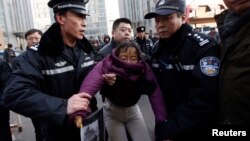In China, the government continues to commit human rights abuses.
According to the State Department's 2014 Human Rights Report, repression and coercion were routine, particularly against organizations and individuals involved in civil and political rights advocacy and public interest issues, ethnic minorities, and law firms that took on sensitive cases. In particular, the government convicted civil society activists associated with the New Citizens Movement in retribution for their public campaign to expose official corruption, including activists Xu Zhiyong and Yang Maodong.
Authorities resorted to extralegal measures such as enforced disappearance and strict house arrest, including house arrest of family members, to prevent public expression of independent opinions. Authorities continued to censor and tightly control public discourse on the internet. Public-interest law firms continued to face harassment, disbarment of legal staff, and closure.
There was severe official repression of the freedoms of speech, religion, association, and assembly of Uighurs in the Xinjiang Uighur Autonomous Region and of Tibetans in the Tibet Autonomous Region and other Tibetan areas. These minorities also faced severe restrictions on movement.
The Chinese government continued to implement counterproductive policies in Xinjiang that exacerbated tensions and targeted Uighurs for peacefully expressing opposition to official policies and actions. In September 2014, Ilham Tohti, a Uighur scholar who promoted moderation and reconciliation between the Uighur and Han ethnic groups in China, was sentenced to life in prison.
Other human rights abuses in China during the year included alleged extrajudicial killings, including executions without due process; enforced disappearance and incommunicado detention, including prolonged illegal detentions at unofficial holding facilities known as “black jails”; torture and coerced confessions of prisoners; detention and harassment of lawyers, journalists, writers, bloggers, dissidents, petitioners, and others who sought to exercise peacefully their rights under the law.
The Chinese government did not provide protection against the expulsion or forcible return of refugees and asylum seekers and pressured other countries to return Chinese citizens forcibly. The government continues its coercive family planning policy that in some cases resulted in forced abortion - sometimes at advanced stages of pregnancy- or forced sterilization.
As U.S. Secretary of State John Kerry said, “No country can fulfill its potential if its people are held back, or more so if they are beaten down by repression. . . Countries do best when their citizens fully enjoy the rights and freedoms to which they are entitled." This includes the people of China.






